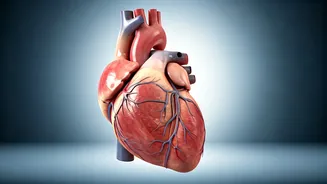Push-Up Heart Health
An intriguing assessment of cardiovascular fitness involves a common exercise: the push-up. According to insights from an AIIMS-trained medical professional,
this exercise offers a quick, practical method to evaluate heart health. Studies suggest that individuals capable of performing 40 or more push-ups exhibit a considerably lower risk of experiencing heart problems. This finding underscores the utility of simple physical tests in assessing an individual's general health condition. The capacity to execute a certain number of push-ups correlates with enhanced cardiovascular efficiency, highlighting the role of exercise in maintaining a healthy heart. It's an accessible method, beneficial for a wide array of individuals, especially when assessing one's current state of fitness.
Early Cancer Concerns
The growing incidence of cancer among younger individuals is a significant public health worry. This trend raises the importance of preventive measures and early diagnosis strategies. The increase is not just a statistical variation; it is a concerning sign of lifestyle and environmental factors. Obesity, in particular, emerges as a significant contributor to this increase. The effects of an unhealthy weight go beyond aesthetics, as obesity is linked to several types of cancer. Research into lifestyle factors and cancer risk shows that diet, exercise, and exposure to environmental toxins significantly influence cancer development. It becomes crucial to incorporate healthy lifestyle practices into one’s daily routine.
The Obesity Connection
Obesity stands out as a leading risk factor in the escalating rates of cancer, specifically among younger populations. This highlights the vital need for a holistic healthcare approach addressing this challenge. Obesity influences several physiological pathways that support the growth of cancer cells, thereby increasing the risk of this condition. Addressing obesity through enhanced diet and activity interventions is crucial for reducing cancer risk. Healthcare providers and communities must increase awareness about the dangers of obesity and promote healthier habits. This connection warrants detailed investigations to fully understand the impact of obesity on cancer and discover innovative methods for prevention and treatment.
Detecting Silent Attacks
The ability to recognize silent heart attacks is crucial, and that is why awareness is key. These episodes, which frequently show no clear warning signs, can be life-threatening if they go unnoticed and untreated. Typical symptoms, like bloating and chest discomfort, might be easily ignored. Medical professionals are focusing on improved diagnostic tools and public education to improve outcomes. Prompt medical assistance is crucial for successful treatment and the avoidance of irreversible heart damage. Education should emphasize routine screenings, particularly for those with risk factors, which improves the detection rates for silent heart attacks. Recognizing these silent symptoms might potentially save lives and improve overall cardiovascular health.
Lifestyle as Prevention
Embracing a lifestyle that promotes cardiovascular health includes a blend of several important habits. Regular exercise, particularly activities like the push-up test, is helpful. This allows people to evaluate their overall fitness, making it easier to adjust their exercise routine accordingly. Following a balanced diet, filled with wholesome foods and decreasing processed foods, is critical for weight management and overall health. Managing stress and prioritizing enough rest and sleep contributes to a well-rounded strategy for enhancing heart wellness. Making these lifestyle modifications can significantly lower the risk of heart disease and associated health issues. Consistency is the foundation of long-term health benefits, motivating people to maintain a healthy lifestyle for lasting results.













